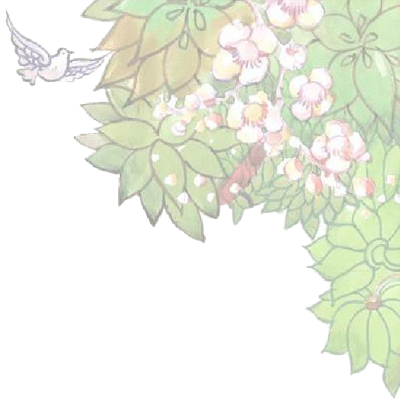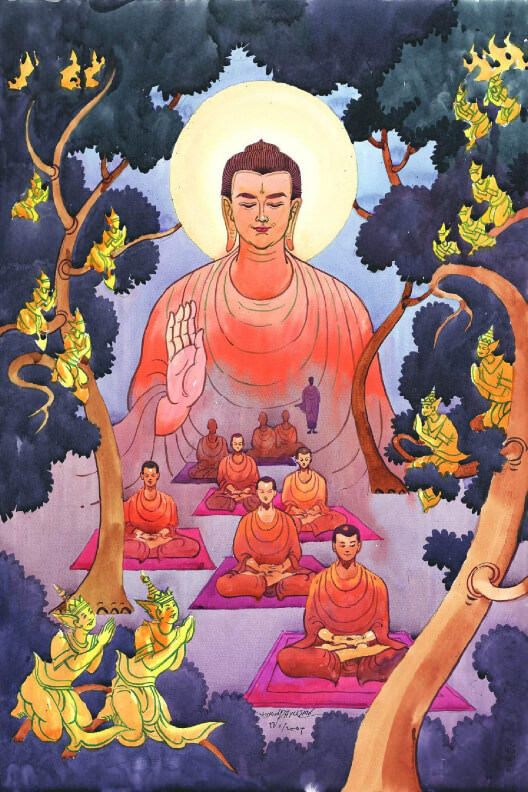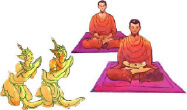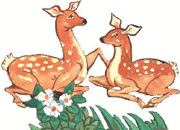48話 生きとし生けるものを慈しんで ・・・・ 「慈経」

第4部 ブッダをめぐる人々
第5章 在家信者への教え
48話 生きとし生けるものを慈(いつく)しんで ・・・・ 「慈経」

あるとき、世尊がサーヴァッティ(舎衛城)に住まわれていて、雨安居に入る時期が近づいてきたころのことである。
雨期(ヴァッサナ)の間、比丘たちは一か所に三か月間滞在しなければならない、という修行上の決まり(律)がある。この律は、比丘たちが雨期に遍歴遊行の旅の途上、発育している農作物を踏み荒らすことがないように、と定められた。そして雨安居の終わりに、比丘の僧団(サンガ)は、一つの場所でいっしょに雨安居をすごした比丘たちの集会として自恣(パヴァーラナ)を行う。その儀式のなかで、出席者の各自が同席しているほかの比丘に、それまで三か月間の雨安居中に、見たり、聞いたり、あるいは気づいたり、したことで律に違反している疑いがあれば指摘するように請う(パヴァーレーティ)のである。
この当時、比丘たちには、さまざまな土地で雨安居に入る前に、世尊から冥想の対象の教示をもとめる習慣があった。そしていまや、雨安居前になって、五百人の一団の比丘や、さまざまな異国からやってきた多数の比丘たちが、それぞれ世尊に冥想の対象の教示をもとめるために世尊に近づいたのである。
世尊はそこで、冥想の対象をそれぞれの機根、資質に合わせて、詳しく説明されたのであった。たとえば性欲の強い者には十不浄を、怒り憎しみの強い者には慈しみから始まる四無量(慈悲喜捨、四梵住)を、迷いとまどう痴愚の者には入息・出息念を・・・などであった。また、信心の篤い者には仏随念を、知識的な者には地水火風の四大物質の差別(分析)を、という具合であった。
(訳注:アビダンマでは、サマタ冥想の対象・止業処として四十業処(カンマッターナ)がある。すなわち、青黄赤白の色などの十遍(カシナ)や十不浄(アスバ)、十随念(アヌッサティ)、四無量(ブラフマヴィハーラ)、一食厭想(アーハーレーパティクーラサンニャー)、一差別(ヴァワッターナ)、四無色定(アルーパ サマーディ))
それで五百人の一団の比丘が各自、世尊の御前で、冥想の対象の教示をしてもらったとき、かれらは雨安居の場所としてふさわしく、托鉢に行くのに適当な村を探す許可を世尊に求めた。かれらの遍歴遊行の途中、ヒマラヤ山脈にある遠離の土地で、美しい景観の場所と出会った。その地は、青い水晶のように玲瓏と光る岩肌に、冷気漂う鬱蒼たる樹林がつづき、真珠の網か銀箔みたいな砂を一面に撒いて敷きつめたような大地が広がり、気持ちよく冷えた水がわき出る清らかな泉があった。
さて今、比丘たちがそこで一晩過ごしたあと、托鉢に行く時間となったとき、かれらは森からそれほど遠くない村へ出かけた。村の住人は一千の家族からなっていた。村人たちは世尊を信用し、信頼していた。出家(パッバジタ)した者らを眼にすることはとてもまれだったので、村人たちが比丘を見たとき、たいへん喜び、うれしがった。村人たちは比丘たちに托鉢食を布施し、雨期の三か月間の雨安居の住まいとして当地に滞在されるように、と請うた。さらに加えて五百の小屋を建て、寝台や椅子、水飲み用や洗濯用の壺などをそなえつけた。そしてその次の日、比丘たちがほかの村へ托鉢に行くと、そこの村人たちもまったく同様に献身的に奉仕してくれて、かれらもまた、雨安居の滞在を請うた。比丘たちは、なんの障碍もないことを見てとり、村人たちの申し出を受けたのである。
そのようにして、托鉢のために村に入り、朝の食事をして、五百人の比丘は戻って、森に入った。木々の根もとに行って、足を組んで坐り、それぞれが世尊に教示してもらった冥想対象に心を集中した。昼も夜も冥想に精進して、夜の区分時刻の更には木塊(木のかたまり)を叩いて知らせた。
こんな比丘たちの実直な冥想ぶりを見て、木々の頂上に棲みついていた樹神たち(ルッカ デーワター)は意気阻喪してしまった。かれらの棲まいから降りてきて、樹神のこどもたちとともに、あちこちうろついた。ちょうど王たちか、王の大臣たちが占拠した村のようで、村人たちが村のあちこち、いたるところへ追いやられ、遠くから眺めてとまどいながら、「いったいいつ、あの方たちは立ち去るのだろうか?」と、思うように、樹神たちは遠くから眺めて「いったいいつ、比丘たちは立ち去るのだろうか?」と、思ったのである。
樹神たちは、比丘たちのとうてい歓迎できない居坐りに憤慨して、追い払おう、と望んだのだった。そしてそのとき、こんな考えがかれらの心に浮かんだ。
(初めて雨安居に入る比丘たちは、きっと三か月間、滞在するのだろう。しかし、われらはこどもたちを抱えて、そんなに長いあいだ、ここから離れて暮らせない。われらは、比丘たちが恐ろしくて逃げ出していくようなものを何か見せてやろう)
そこで毎夜、比丘たちが冥想実践するときは、樹神たちは恐ろしい妖怪をつくって比丘たちの前に立たせた。ぞっとする物音も立てた。比丘たちは、恐ろしい妖怪を見て、ぞっとする物音をきくと、胸がどきどきして、ふるえおののいた。血の気が引き、蒼白になって黄ばんでしまい、もはや冥想対象に心を集中できなくなった。さらに何度も何度もこの恐怖にさいなまれて、心の集中がとぎれ、気づきをたもつことができなくなった。気づきが混乱するやいなや、またもや樹神たちは反吐が出そうな悪臭を立てて、比丘たちを悩ませた。この嫌がらせを受けて、比丘たちの頭は、悪臭で息が詰まりそうで、不快な思いが、かれらの頭に重くのしかかった。しかしながら、比丘たちはこのひどい経験を互いに話さなかった。
それから、法の議論の日と決められていたある日、僧団の上座の長老が比丘たちに、こう尋ねた。
「友のみなさん、あなたたちがこの村に来られたとき、数日間は肌の色が清々しく、輝いていた。そして心身のはたらきは冴えていた。ところがいまや、あなたたちは、みすぼらしく、蒼白で、黄ばんでいる。ここの何があなたたちに合わないのですか?」
すると比丘の一人が、こういった。
「長老さま、毎晩、わたしが木の下で冥想しているとき、恐ろしい妖怪を見て、ぞっとする物音を聞き、ひどい悪臭を嗅ぎます。このことで、わたしの心は集中せず、もはや気づきを保つことができないのです」
ほかの比丘たちも同じふうに、起きたことを語った。上座の長老が、いった。
「友のみなさん、雨期に雨安居入りするには、世尊によって二つの始まりの時期が知らされています。そして、この雨安居の地は、われらに適切ではありません。そこで、世尊のもとに行って、われらに合った別の雨安居の地を相談したほうがよいでしょう」
(訳注:雨安居入りの時期は、現代暦の六~七月に相当するアーサーラー月の満月の翌日か、アーサーラー月の満月の一か月後の日の、二つと定められている。ここは、二つ目の雨安居入りの日まで、まだ日がある、という意味で、特別な理由があれば第二の雨安居に入ることができる)
比丘たちは、この指示に納得した。雨安居の住まいにしていた場所をすべて元どおりにして、托鉢の鉢と外衣を持ち、托鉢に行っている村の住人にはいっさい何も告げず、サーヴァッティめざして段階的に行く遍歴遊行に出発した。
とうとうサーヴァッティに到着すると、ただちに世尊の住まわれているところへ行った。かれらを見かけて世尊は、こういわれた。
「比丘たちよ、雨期に遍歴遊行してはいけない、とわたしが定めた修行の決まり(学処)を知らないのですか? なぜ、そなたたちは遍歴遊行しているのか?」
そこでかれらは世尊に、かれらが夜間に経験したことすべてを告げて、雨期を過ごす別の適切な場所があるかどうか、尋ねた。しかしながら、世尊が神通力でジャンブ洲全体に注意を向けられると、ほかのどこにも、四脚の椅子ひとつ分の場所すら、かれらにとって適切な場所が見当たらなかった。
そこで世尊は、かれらに呼びかけた。
「比丘たちよ、ほかのどこにも、そなたたちにとって適切な場所はない。そこに住むことによってのみ、そなたたちは煩悩の滅尽に到達するかもしれないのです。さあ、だから、ほかならぬその場所へ行って、とどまりなさい! しかし、もし樹神たちの恐怖から逃れたいと願うのなら、そなたたちはこの護呪(訳注:不幸や病気などの災厄から守護する教え。パーリ語ではParitta(パリッタ))を学びなさい。これは、そなたたちのお守りにも、冥想の課題にも、両方になるであろう」
そして世尊は、以下の慈悲の偈を、かれらに説かれたのである。
“解脱という善行為の目的をよくわきまえた者が、
静かな場所へ行ってなすべきことがあります。
何事にも有能で、しっかりして、まっすぐ、しなやかで、
人の言葉をよくきき、柔和で、高慢でない人になるように。”
“足ることを知り、手がかからず、
雑務少なく、簡素に暮らし、
もろもろの感覚器官が落ちついていて、賢明で、
裏表がなく、在家に執着しないように。”
“どんな小さな過ちも犯さないように、
智慧ある識者たちが批判するようなことは。
幸福で平和でありますように!
生きとし生けるものが幸せでありますように!”
“いかなる生命であろうとも、
動きまわっているものでも、動きまわらないものでも、ことごとく、
長いものでも、大きなものでも、
中くらいのものでも、短いものでも、微細なものでも、巨大なものでも、”
“見たことがあるものも、見たことがないものも、
遠くに住むものでも、近くに住むものでも、
すでに生まれているものも、これからまだ再生しようとしているものも、
生きとし生けるものが幸せでありますように!”
“どんな場合でも、ひとを欺いたり、
軽んじたり、してはいけません。
怒鳴ったり、腹を立てたり、
お互いにひとの苦しみを望んではいけません。”
“あたかも母親が息子を守るように、
たった一人のわが子を命がけで守るように、
そのように、すべての生命に対しても、
無量の慈しみの心を育ててください。”
“慈しみの心をすべての生命の一切世間に対して、
限りなく育ててください。
上に、下に、横にも、周りすべてに、
わだかまりのない、怨みのない、敵意のない心を育ててください。”
“立っているときも、歩いているときも、坐っているときも、
あるいは横になっていても眠っていない限り、
この慈悲の念をしっかり保っていてください。
これが崇高なものの生き方である、といわれています。”
“このように実践する人は邪見を乗りこえ、
つねに戒を保ち、正見を得て、
もろもろの欲望に対する執着をなくし、
もう二度と母胎に宿って輪廻を繰り返すことはありません。”
世尊は、この説教を終えるにあたって、比丘たちに、このように説示した。
「行け、比丘たちよ、そして同じ元の森に住みなさい! 各月八日目の聞法の日に、木塊を叩いて、この慈しみの偈を読誦しなさい! それから仏法についての話し合いをして、生きとし生けるものへ感謝を表現してください。この慈悲の冥想を育ててください! それを保持し、それを発達させなさい! そのように行うのをふだんの習慣とすることによって、人ではないものも、必ずやそなたたちの安楽を望み、そなたたちの幸福をもとめるであろう」
比丘たちは世尊のこの説示を受け入れた。それぞれの席から立ち、右回りしつつ世尊に礼拝し、やって来た元のところへ戻った。そして教えられたことを実践した。
比丘たちがまた再び戻ってきて、安楽を望み、幸福を求めていることを伝え聞いて、樹神たちは幸せと喜びにみたされた。こわいことを見せる代わりに、樹神たちは、危険から比丘たちを守るよう配慮した。比丘たちが、そこにとどまることが適しているとわかり、もはや障碍はない、とわかって、まともに冥想ができた。かれらは、生きとし生けるものへの慈しみを発達させ、それを冥想の基礎にした。それから、心の内側の観察冥想(ヴィパッサナー修習)を育て、無常・苦・無我の三つの特徴を観察した。そして最終的には、かれらのすべてが、まさに雨安居のうちに、阿羅漢に達したのである。
※ 画像やテキストの無断使用はご遠慮ください。/ All rights reserved.

Episode 48 THE ALL-EMBRACING LOVING-KINDNESS
On one occasion, the Blessed One was residing in Sāvatthi when the time for taking up rains-residence was drawing near.
There is a disciplinary rule that bhikkhus had to stay in one place for three months during the rainy season (vassāna). The rule was made in order that growing crops not be trampled on by bhikkhus wandering from place to place. And at the end of the rains-residence, the Saṁgha of bhikkhus would hold the Pavāraṇā (Invitation) Ceremony, consisting in a meeting of the bhikkhus who have spent the rains-residence together in one place. In the ceremony, each member present would invite (pavāreti) the other bhikkhus to point out such breaches of Vinaya rules committed by him during the preceding three months as may have been seen, heard or suspected by them.
In those days, there was a custom for bhikkhus to seek meditation instruction from the Blessed One before taking up residence for the rains in various places. And now, on that occasion, a group of five hundred bhikkhus and a large number of bhikkhus from various countries approached the Blessed One, each with the purpose of obtaining a meditation subject from Him.
The Blessed One would then expound meditation subjects suitable for each, according to their temperament. For example, for those of lustful temperament He would prescribe the ten kinds of foulness as a meditation subject; for those of hateful temperament, the fourfold meditation subject beginning with loving-kindness; for those of deluded and discursive temperament, the meditation subject consisting
in mindfulness of breathing, etc.; for those of faithful temperament, the meditation subjects consisting of the recollections of the Enlightened One, etc.; and for those of intellectual temperament, the analysis of the four elements.
So, when a group of five hundred bhikkhus had each learnt a meditation subject in the Blessed One’s presence, they asked for permission from Him to seek a suitable residence for the rains where there is a village as an alms-resort. In the course of their wanderings, they came to a secluded spot with a scenic beauty of a mountain forming part of the Himalayan range. The site was glitterring like a blue quartz crystal, and it was adorned with a multitude of cool deep-shaded forest trees and a stretch of ground strewn with sand resembling a pearl net or a silver sheet, and it was supplied with a clean spring of pleasingly cool water.
Now, after the bhikkhus had spent one night there, in the early morning when it was time for alms-round, they went to a village not far from the forest. The residents of the village consisted of a thousand clans; they had faith and confidence in the Blessed One. Since it was very rare to see those gone forth into homelessness
(pabbajita), they were very happy and joyful when they saw the bhikkhus. They offered almsfood to the bhikkhus and invited them to stay there for three months for the obligatory residence during the rains. Moreover, they had five hundred huts built and furnished, with all such necessaries as beds, chairs, pots for drinking water and
washing water, and so on. And on the following day, when the bhikkhus were going for alms to another villlage, they found the people devotedly serving them in the same manner; they also invited them to stay for the rains there. The bhikkhus, seeing that there was no obstacle, consented to their invitation.
Then, having gone into the village for alms and taken the meal in the morning, those five hundred bhikkhus came back and entered the forest. They went to the foot of trees and sat down cross-legged abiding in the meditation subject given by the Blessed One. They put their strenuous effort day and night by having a wood-block struck for the watches.
Seeing those virtuous bhikkhus meditating, the devas who were dwelling on the tree tops (rukkha devatā) became discouraged. They came down from their mansions and wandered back and forth with their children. Just like a village being seized by kings or royal ministers, with the inhabitants being forced to live elsewhere, watching from a far and wondering “When are they going away?”, even so the tree devas watched the bhikkkhus from a distance, wondering “When are the Venerable ones going away?”
The tree devas resented their unwelcome presence and wanted to drive them away. And then, such a thought came to their minds: “Bhikkhus who enter upon the first period of the rains-residence will certainly stay on for three months; but we cannot live with our children away from home for a long time. Let us show the bhikkhus some object that will frighten them away.”
So every night, when the bhikkhus were engaged in their meditation practice, the devas created terrifying forms standing before them. The devas also made a horrifying noise. When the bhikkhus saw the horrible forms and heard the dreadful noise, their hearts trembled. They grew pale and jaundiced, and they could no longer maintain their attention on the meditation object. And when they were harassed again and again by this fear, their concentration was ununified, and they could not
uphold their mindfulness. As soon as their mindfulness was bewildered, again the tree devas created disgusting smells and harassed them with it. With this harassment, their brains seemed to suffocate in the foul smell, and they were oppressed with unpleasant feelings in their heads. However, they did not tell their horrible experiences to each other.
Then, on one appointed day of the Dhamma discussion, the senior elder of the Order asked the bhikkhus: “Friends, when you went into this forest, for a few days the colour of your skin was quite pure and bright, and your faculties were clear; but now you are lean, pale and jaundiced. What does not suit you here?”
Then a bhikkhu said: “Venerable sir, when I practise meditation under the tree every night, I see horrifying forms, hear a dreadful noise, and smell a foul smell. Because of this, my mind is not concentrated, and I can no longer maintain my mindfulness.” And so did the other bhikkhus tell what had been happening in the same way.
The senior elder said: “Friends, two kinds of entry upon residence for the rains have been made known by the Blessed One, and this dwelling place does not suit us. Now it’s better for us to go to the Blessed One and consult Him about another dwelling place that will suit us.”
They agreed with the proposal. Having put all their dwelling places back in order, they took their alms-bowls and outer robes and set out to wander by stages to Sāvatthi, without even telling the inhabitants of their alms resort.
At last, they arrived at Sāvatthi and directly approached where the Blessed One was staying. And when the Blessed One saw them, He said:
“Bhikkhus, don’t you know that I have laid down a training rule prohibiting anyone from wandering during the rains? Why are you wandering?”
Then, they informed the Blessed One all of their nocturnal experiences and asked Him whether there was another suitable place for them to spend the rains. However, when the Blessed One adverted to the whole of Jambudīpa with His supernormal power, He did not see any other dwelling place which was suitable for them, not even so much as a place for a four-legged chair.
Then, the Blessed One addressed them: “Bhikkhus, there is no other place that will suit you. It is only by living there that you might reach the extinction of defilements. So now, go and stay at the very place! But if you want to be free from fear of the devas, then you should learn this protection; for this will be both a safeguard and a meditation subject for you.”
And the Blessed One taught them these stanzas of loving-kindness:
“This is what should be done by one who is skilled in goodness,
And who wishes to attain the state of peace:
He should be capable, upright, perfectly upright,
Obedient, gentle, and not conceited.”
“Contented, easy to support,
With few duties, living lightly,
Controlled in his senses, prudent,
Not impudent, and not be greedily attached to families.”
“He should not commit any slightest wrong
That the wise men might censure.
May all beings be happy and safe!
May their hearts be happy!”
“Whatsoever living beings there may be:
Feeble or strong, without exception,
Long or big,
Medium or short, small or fat,”
“Seen or unseen,
Those dwelling afar or near,
Those who have been born or those who are yet to be reborn.
May all beings, without exception, be happy!”
“Let none deceive another,
Nor despise any person in any place.
Let none through anger or ill-will
Wish any harm upon another.”
“Just as a mother would protect her son,
Her only child, at the risk of her own life,
Even so, should one cultivate a boundless heart
Towards all living beings.”
“Let his thoughts of boundless love
Pervade the whole world
Above, below and all around,
Without any obstruction, free from hatred and enmity.”
“Whether standing, walking, seating or lying down,
So long as one is free from drowsiness,
One should develop this mindfulness in loving-kindness.
This is called the Divine Abiding here.”
“By not holding on to wrong views,
Being virtuous and endowed with clarity of vision,
Discarding attachment to sense desires,
One never again will be conceived in any womb.”
Having concluded His Teaching, the Blessed One instructed the bhikkhus: “Go, bhikkhus, and live in that same forest grove! On the eighth day in each month for the hearing of the Dhamma, have the wood-block struck and recite these stanzas of loving-kindness! Then, have a discussion on the Dhamma, and express your gratitudes towards all living beings! Cultivate this meditation subject! Maintain it and develop it! By doing so routinely, those non-human beings will most surely wish you well and seek your good.”
The bhikkhus accepted the Blessed One’s advice. After they rose from their seats and had paid homage to the Blessed One—keeping Him on their right—they departed to go back to where they had come from; and they did as they had been taught.
Learning that the bhikkhus came back again and wished them well and sought their good, the tree devas were full of happiness and joy. Instead of showing dreadful things, they arranged to protect the bhikkhus from danger. While the bhikkhus found suitability staying there and found no more obstruction, they could meditate properly.
They developed loving-kindness to all living beings; they made it a basis of meditation. Then, they cultivated insight meditation and observed the three general characteristics of impermanence, suffering, and not-self. And finally, all of them attained Arahantship in the very rains-residence.
※ 画像やテキストの無断使用はご遠慮ください。/ All rights reserved.
アシン・クサラダンマ長老
1966年11月21日、インドネシア中部のジャワ州テマングン生まれ。中国系インドネシア人。テマングンは近くに3000メートル級の山々が聳え、山々に囲まれた小さな町。世界遺産のボロブドゥール寺院やディエン高原など観光地にも2,3時間で行ける比較的涼しい土地という。インドネシア・バンドゥンのパラヤンガン大学経済学部(経営学専攻)卒業後、首都ジャカルタのプラセトエイヤ・モレヤ経済ビジネス・スクールで財政学を修め、修士号を取得して卒業後、2年弱、民間企業勤務。1998年インドネシア・テーラワーダ(上座)仏教サンガで沙弥出家し、見習い僧に。詳しく見る
奥田 昭則
1949年徳島県生まれ。日本テーラワーダ仏教協会会員。東京大学仏文科卒。毎日新聞記者として奈良、広島、神戸の各支局、大阪本社の社会部、学芸部、神戸支局編集委員などを経て大阪本社編集局編集委員。1982年の1年間米国の地方紙で研修遊学。2017年ミャンマーに渡り、比丘出家。詳しく見る

※ 画像やテキストの無断使用はご遠慮ください。
All rights reserved.

